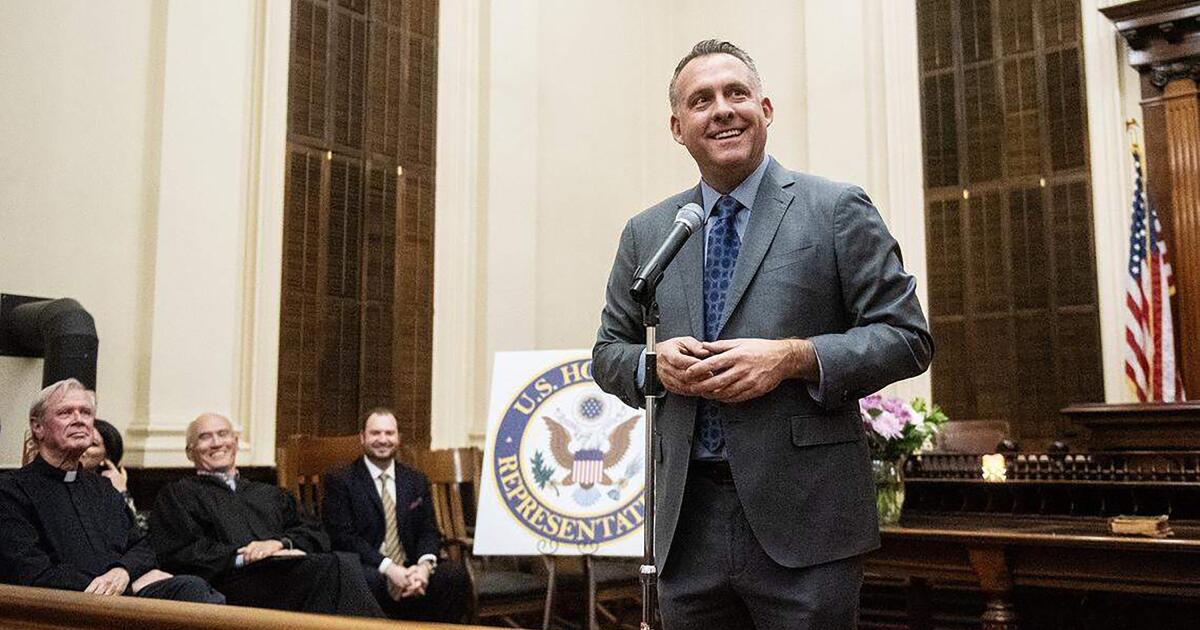WASHINGTON — Rep. Adam Gray was one of only six House Democrats — and the only one from California — who voted with Republicans in favor of a deal to end the government shutdown, and there was a calculated reason behind that decision.
Gray, a first-term Democrat from the Central Valley, is running for reelection in a majority Latino district that national Republicans are expected to heavily target as they defend their narrow House majority in next fall’s midterm elections. Last year, Gray won his seat by 187 votes, and although redistricting has since made the 13th District more favorable to Democrats, it remains highly competitive.
The Merced Democrat’s vote reflects the political reality of representing one of the nation’s few battleground districts. Gray is positioning himself as an independent-minded Democrat willing to buck leadership on politically divisive issues. The shutdown deal gave him a rare opportunity to put that in practice, even at the risk of frustrating members of his own party.
“I know it is not comfortable, and I know there’s people that are going to be mad at me,” Gray told The Times. “But I am not here to win an argument. I am here to actually help fix problems with people in my community, and I know I did the right thing.”
Democratic representatives and senators for weeks were steadfast in opposing a shutdown deal that did not include language to extend Obamacare tax credits that are set to expire at the end of the year, and as a result, leave millions of Americans with higher healthcare costs.
In Gray’s district, more than half of residents rely on Medi-Cal or have coverage through the Affordable Care Act marketplace, making them vulnerable to rising healthcare costs — a pocketbook issue that is likely to factor into an already competitive congressional race.
Beyond healthcare, nearly 48,000 families in his largely rural district rely on food benefits through the Supplemental Nutrition Assistance Program, known as SNAP, according to the latest data provided by the Department of Agriculture. Those benefits were put at risk during the shutdown as funding for the federal program commonly called food stamps was caught up in legal disputes.
As the shutdown dragged on without meaningful negotiations on healthcare, Gray said, he grew concerned that Republicans were too comfortable “using vulnerable Americans as political leverage.”
Ultimately, Gray was among just 13 Democrats — six in the House, seven in the Senate — who went against their party to end the shutdown that had dragged on an historic 43 days.
“The government is reopening because Democrats were willing to compromise,” Gray said.
The deal, which was signed by President Trump last week, will fund the government through January 2026 and reinstate federal workers who were laid off during the shutdown. It will also fund SNAP through September 2026, a provision that Gray says he wanted to secure because he worries that partisanship could lead to another shutdown in January.
Republicans attack his position
Although Gray voted with Republicans over the shutdown, national Republican operatives still see his seat as a main target ahead of next year’s election — and there is good reason for that.
The seat has a history of party flipping.
In 2024, Gray won his seat by 187 votes, the slimmest margin of any race in the country. His opponent, Republican John Duarte, who cast himself a centrist in the race, had only held the seat for one term before being beat. (And he defeated Gray two years earlier by just 564 votes.)
President Trump carried the 13th last year by five points, underscoring the competitiveness of the Central Valley district which backed Joe Biden in the first Biden-Trump matchup of 2020.
The passage of Proposition 50 has made the district safer for Democrats as the new congressional map shifts parts of Stockton, Modesto and northern Stanislaus County into the district, while removing more conservative, rural territory west of Fresno. Still, it remains a highly competitive district.
Like Duarte, Gray has positioned himself as a centrist, but that hasn’t stopped Republicans from portraying him as being from the party’s far-left flank.
Christian Martinez, a spokesperson for the National Republican Congressional Committee, is now focusing on Gray’s voting history on the shutdown as a reason to criticize the incumbent. Specifically, how Gray in September abstained from voting on a bill that would have prevented the shutdown.
“Instead of delivering results for Californians, out-of-touch Democrat Adam Gray is too busy appeasing his radical socialist base, and now he’s fully responsible for holding Americans hostage with the longest government shutdown in history,” Martinez said.
Martinez added that “hardworking Californians paid the price for his refusal to vote to keep the government open, and next November, they’ll send him packing.”
Gray is now facing a Republican challenge from former Stockton Mayor Kevin Lincoln. When Lincoln announced his bid on Nov. 6, before the shutdown deal vote, he criticized Gray for not doing enough to prevent the shutdown in the first place.
“Washington politicians like Adam Gray have fallen in line with a failed liberal agenda that’s made life less affordable and less safe,” Lincoln said in a statement.
Moving forward, Gray sees the vote as an opportunity to reset negotiations and find a bipartisan solution before funding runs out again on Jan. 30, 2026.
“I think we’re moving in the right direction,” Gray said. “I hope my colleagues have the courage to do the right thing over the next days.”
Back in his district, Democrats have had a mixed reaction to his vote. As for his congressional colleagues, they have not offered up much criticism, choosing to let Gray explain his vote to the ever-changeable 13th District.
